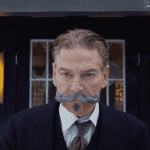
Ronsel Jackson (Jason Mitchell), Hap’s son, goes to Europe and serves on a tank, finding rare acceptance and falling in love with a German girl. He feels a sense of freedom that he’d never felt before.
But the acceptance he found overseas still eludes him when he comes back home. He’s forced to sit in the back of the bus and walks by “Whites Only” signs. When he tries to go through the front door at a local store, Pappy McAllan and a couple of his friends stop him. “You in Mississippi now, son,” he’s told. “You use the back door.”
Ronsel snaps back, trying to get the credit a war hero deserves. That evening, Henry stops by the Jackson shanty, demanding an apology for both he and his father. Ronsel, prompted by Hap, reluctantly agrees. “I’m just not used to walking away from a fight now, Dad,” Ronsel says. “That’s all.”
Jamie (Garrett Hedlund), Henry’s brother, goes to war, too, flying a bomber and becoming a captain. But while he returns physically intact, he’s deeply scarred mentally—falling to the ground at the sound of a backfiring pickup, trying to still his shaking hands when grabbing a hat. Soon, he and Ronsel strike up an improbable friendship. Jamie begins picking up Ronsel on trips into town, where they swap booze and cigarettes and stories. They get together in secret: Pappy—heck, much of that corner of Mississippi—would never tolerate a white man and a black man hanging out together. But both Jamie and Ronsel have had about enough of the status quo.
One day, Ronsel asks Jamie why he’s being so kind. In answer, Jamie tells Ronsel a story:
One day, his bomber was attacked by hordes of German Messerschmitts: He lost his co-pilot and gunner, and the Nazi planes were buzzing around him, hoping to finish the job. Jamie said a prayer right then—promising God that if He somehow made it out of this scrape, Jamie would turn over a new leaf. He’d be, in his words, “so good.”
Suddenly, the sky was filled with American P-51 fighters that drove the Germans away. “I swear they were angels sent by the Lord himself,” he tells Ronsel. And then he drops the clincher: The tails of these P-51s were all painted red—the symbol of the Tuskegee Airmen, an African-American squadron. When he looked across the sky to see the face of one of his saviors, he saw that he was “colored.”
“He saluted me,” Jamie says. “I saluted back.”
But reconciliation in the deeply segregated, seething south was not to be, despite the will and intention of those who would wish it. Pappy would see to that.












